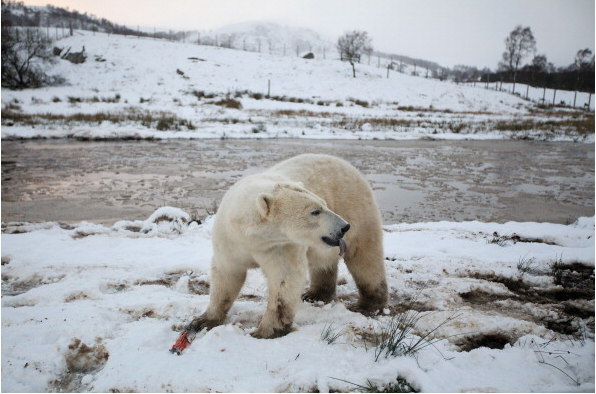By Angel Soleil, | September 16, 2016

A Polar Bear in the Arctic
A new research suggests that Polar Bears are more prone to extinction due to climate change than we think. As their frozen habitats shrink, Polar bears will find themselves facing starvation as they cannot adapt to land-based food.
The sea ice around the Arctic is fast declining, and scientists have theorized that Polar Bears may be forced to adapt to hunting on land. According to the study published in the Journal Frontiers in Ecology by researchers from the US Geological Survey (USGS), bears are unlikely to survive on goose eggs and berries. Polar bears have evolved to survive on the flesh of seals, and terrestrial food can not make up for that.
Like Us on Facebook
Scientists do not have sufficient evidence that land-based food could substitute of the Polar Bear's winter diet. According to The Guardian, polar bears are losing significant weight due to climate change. Analyzing data about 900 bears captured between 1984 and 2009, researchers found out that the average weight of male polar bears has dropped by 45kg, while females by 31kgs.
This, according to the study, is alarming as it could ultimately affect the survival of the population. There is a strong possibility that female polar bears would have less success in getting pregnant as a result. This makes the animal even more vulnerable to extinction as Polar bears are already listed as an endangered species.
As the lack of food leaves Polar bears starving, scientists suggest that hungry bears could resort to risky and aggressive behavior. This could lead to acts of cannibalism, or the situation being faced by five scientists trapped in the Arctic.
The five Russian scientists manning the weather station on Troynoy Island are hiding from more than a dozen starving polar bears surrounding their hut. The bears have prevented them from carrying out their tasks.
Vassiliy Shevchenko, the head of the Sevgidromet State Monitoring Network which owns the weather station in the Arctic, said that human-polar bear interactions are normal in the context of Artic weather stations. But what makes the circumstance dangerous is that the bears are starving and displaying aggressive behavior.
-
Use of Coronavirus Pandemic Drones Raises Privacy Concerns: Drones Spread Fear, Local Officials Say

-
Coronavirus Hampers The Delivery Of Lockheed Martin F-35 Stealth Fighters For 2020

-
Instagram Speeds Up Plans to Add Account Memorialization Feature Due to COVID-19 Deaths

-
NASA: Perseverance Plans to Bring 'Mars Rock' to Earth in 2031

-
600 Dead And 3,000 In The Hospital as Iranians Believed Drinking High-Concentrations of Alcohol Can Cure The Coronavirus

-
600 Dead And 3,000 In The Hospital as Iranians Believed Drinking High-Concentrations of Alcohol Can Cure The Coronavirus

-
COVID-19: Doctors, Nurses Use Virtual Reality to Learn New Skills in Treating Coronavirus Patients







